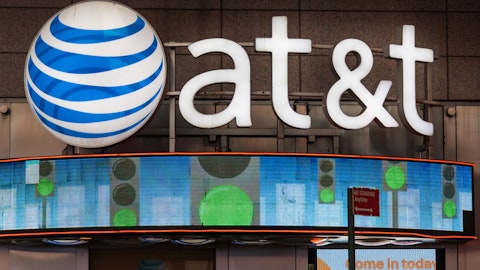Operator: [Operator Instructions] Our next question comes from Louie DiPalma from William Blair. Please go ahead with your question.
Louie DiPalma: Matt, Tom and Ken, good morning.
Matthew Desch: Morning, Louie.
Louie DiPalma: I was wondering, how should investors think about opportunities with the proliferated LEO contract that you announced earlier in the quarter? I think SpaceX was awarded one of the first task orders. And what type of services could this involve for Iridium? Thanks.
Matthew Desch: Yes, thanks. So the government, specifically the Space Force has a lot of opportunities to buy commercial broadband from LEO operators. And it’s complicated if they had to do that with every specific service provider and operator. And so they’ve decided to create this kind of envelope called the PLEO, assign $900 million over say, the next five years and ask all the industry to apply, to be qualified, to basically be awarded task orders off of that. And there were like 20 different awardees, I think, or potentials for that. And we’ve been one of them along with some of our partners, using for Certus L-Band. We’re the only L-Band kind of supplier in this. The rest of it is mostly KA and KU Band suppliers like Starlink and others.
And so we expect as, broadband needs are needed, whether in places like Ukraine and other places, they can just draw off of this IDIQ, indefinite delivery, indefinite quantity contract against that. And it will make it easier for them, in our case, to purchase Iridium Certus for government uses. So it’s an upside. It’s just not specific about exactly what it will be and where it will be, but it will make it easier for them to buy broadband from us.
Louie DiPalma: Great. And for Tom, how should we think about CapEx and SG&A for 2024 relative to 2023, given how there likely won’t be any satellite launches next year? And in the previous answer, you were discussing how you ramped up hiring in 2022. How should we think about those relative levels? I know it’s not 2024 yet, but any color there would be helpful.
Thomas Fitzpatrick: So CapEx, there’s not going to be any launch year, right? So our guide is 50 to 60, I think. That will be in that area in 2024. I think it’s premature to give 2024 guidance on SG&A. We’ll do that when we unveil our 2024 guidance in February.
Louie DiPalma: Great. And one final one. How should we think about the leverage ratio? The prior guidance for this year was between two and a half times and three and a half times. With interest rates continuing to tick up, are you leaning more towards three times versus the high end of that prior range?
Thomas Fitzpatrick: Yes, so we’re saying we see ourselves right around three as we exit this year, Louie. That’s an all in. That’s taking into account everything we know.
Louie DiPalma: Okay, great. Thanks, everyone.
Thomas Fitzpatrick: Thanks, Louie.
Operator: And ladies and gentlemen, at this time and showing no additional questions, I’d like to turn the floor back over to the management team for any closing remarks.
Matthew Desch: Well, obviously a little shorter call than usual because of all the information we provided at Investor Day and all the great conversations that we all had. If anybody hasn’t seen the Investor Day, there is a replay available on our website, and I encourage you to see that. But you’ll see us at conferences and around, and we look forward to seeing you at the fourth quarter results in a couple months. Take care, all.
Operator: Ladies and gentlemen, with that, we’ll conclude today’s conference call and presentation. We thank you for joining. You may now disconnect your lines.
Follow Iridium Communications Inc. (NASDAQ:IRDM)
Follow Iridium Communications Inc. (NASDAQ:IRDM)
Receive real-time insider trading and news alerts



